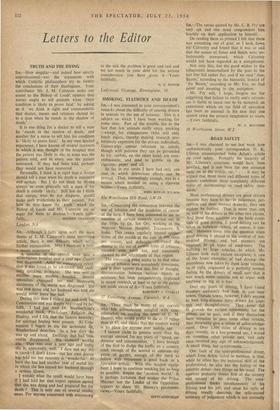Letters to the Editor
TRUTH AND THE DYING
SIR,—How singular—and indeed how utterly unprofessional—are the arguments with which Catholic philosophers try to fortify the conclusions of their theologians. Your contributor Mr. I. M. Cameron seeks our assent to the Bishop of Leeds' opinion that nurses ought to tell patients when ' their condition is likely to prove fatal' by asking us if we think it right and commendable that doctor, nurses and relatives should lie to a man when he stands in the shadow of death.'
It is one thing for a doctor to tell a man he stands in the shadow of death,' and another for a nurse to tell him his condition is ' likely to prove fatal.' In my own limited experience, I have known of several instances in which it was thought at the hospital that the patient was likely to die; in none was the patient told, and in every one the patient recovered. If they had been told, perhaps they would not have recovered.
Personally, I think it is right that a doctor should tell a man when his death is imminent and certain. But I do not think he should always or even generally tell a man if his death is merely 'likely.' Still less do I think that nurses, who do not diagnose, should make such predictions to their patients. For bow do they know the 'truth' which the Bishop of Leeds and Mr. Cameron are so eager for them to disclose ?—Yours faith-
London, N.6


































 Previous page
Previous page